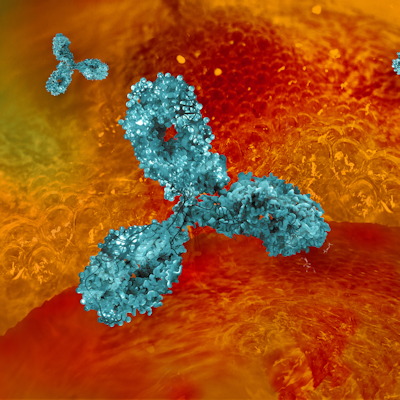November 21, 2022 -- Using CRISPR-Cas9 gene editing, Swiss researchers have provided evidence that expression of an RNA-binding protein helps tumors to evade the immune system.
Previous studies have found cancers that overexpress the protein, fragile X mental retardation protein (FMRP), are invasive and metastatic. The findings suggested that the neuronal regulatory protein may contribute to tumor resistance to immunotherapies, highly effective treatments that are nullified in some patients by cancer cells that evade immune attacks.
In a paper published November 18 in the journal Science, researchers at the Swiss Institute for Experimental Cancer Research, the Lausanne Branch of the Ludwig Institute for Cancer Research, and the University Hospital of Lausanne describe how they built on those studies to show the role FMRP plays in drug resistance.
The collaborators began by confirming that FMRP is overexpressed in cancers by immunostaining human tumor tissue microarrays for expression of the protein. Most tumors expressed FMRP, but normal tissues did not.
That finding encouraged the team to assess the functional significance of FMRP. Using CRISPR-Cas9 gene editing, the researchers knocked out the gene that encodes the protein, FMR1, and used the resulting cell line to establish tumors in immunodeficient and immunocompetent mice. The team compared the FMRP-knockout mice to mice inoculated with wild-type, FMRP-expressing cell lines.
In immunodeficient mice, survival was similar in the knockout and wild-type models, indicating that the protein does not directly stimulate cancer growth. In contrast, in immunocompetent mice without FMRP tumor growth was impaired and survival was extended. The finding suggests the effect of FMRP relates to the adaptive immune system.
That conclusion is supported by analyses of the tumors, which found cancers that expressed FMRP were largely devoid of T cells, whereas the knockout tumors were highly inflamed. Depletion of CD8 and CD4 T cells restored tumor growth and reduced survival, suggesting that FMRP supports immune evasion in wild-type tumors. The findings point to a new way to try to treat solid tumors.
"Having studied the complex cellular composition of solid tumors for decades, I am personally astonished by our discovery that a co-opted neuronal regulatory protein -- FMRP -- can orchestrate the formation of a multi-faceted protective barrier against attack by the immune system that consequently limits the benefit of immunotherapies, thereby presenting FMRP as a new therapeutic target for cancer," the Swiss Institute for Experimental Cancer Research's Douglas Hanahan said in a statement.
A biotech, Opna Bio, has spun out of one of the institutes behind the research to build on the therapeutic implications of the findings.
Copyright © 2022 scienceboard.net









